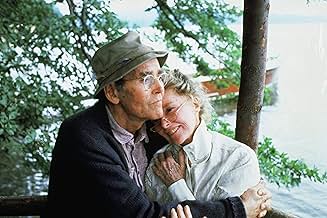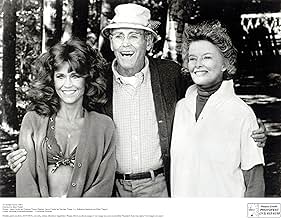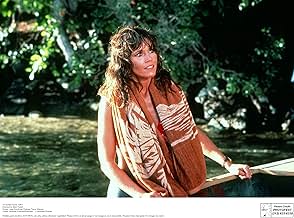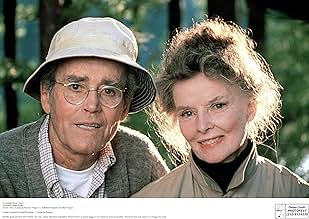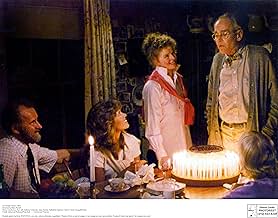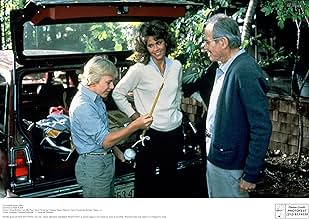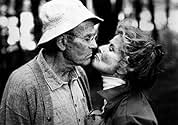AVALIAÇÃO DA IMDb
7,6/10
37 mil
SUA AVALIAÇÃO
Norman é um homem com uma relação estranha com sua filha Chelsea. No Golden Pond, ele e sua esposa concordam em cuidar do filho do novo namorado de Chelsea, Billy, e uma relação muito inespe... Ler tudoNorman é um homem com uma relação estranha com sua filha Chelsea. No Golden Pond, ele e sua esposa concordam em cuidar do filho do novo namorado de Chelsea, Billy, e uma relação muito inesperada floresce.Norman é um homem com uma relação estranha com sua filha Chelsea. No Golden Pond, ele e sua esposa concordam em cuidar do filho do novo namorado de Chelsea, Billy, e uma relação muito inesperada floresce.
- Ganhou 3 Oscars
- 15 vitórias e 24 indicações no total
Avaliações em destaque
It's not many years ago I watched this film for the first time. Had to admit that before watching it I was a bit skeptical, I thought it would be just one of those boring hyper-romantic films but....
Finally when I got the chance to watch it I was breathtaken! This film is simply a masterpiece of a time that, unfortunately, is long gone. A time where love could last a lifetime and still be beautiful at the end of life. How many of those films are made today in this hasty divorce filled time? Not many I'd say!
It was such a beautiful experience to watch this film and in a strange way it made me also sad. Mainly because today's world isn't like that anymore for how many people can stay in love and care for eachother after 50 years? The theme of everlasting love, knowing eachothers habits through a whole life is really something very very special.
The roles as the elderly couple were also played with such an honesty that it was amazing and the music plus the landscape and the actual calmness of the film makes it into a film that won't ever be forgotten; at least it shouldn't be!
Of course it's romantic but it's also realistic and that's what makes it different from other socalled romantic films. There's a catch in it and there's something to think about too!
The beauty of these two old people and their relationship is something I believe many people will envy. Having been together for half a century and still being so much in love as the film shows.
A film that ought to be seen by people who still dare to believe in lifelong love and for those who don't - forget about it then you'll just waste your time or think "jee, that's ridiculous"...
Finally when I got the chance to watch it I was breathtaken! This film is simply a masterpiece of a time that, unfortunately, is long gone. A time where love could last a lifetime and still be beautiful at the end of life. How many of those films are made today in this hasty divorce filled time? Not many I'd say!
It was such a beautiful experience to watch this film and in a strange way it made me also sad. Mainly because today's world isn't like that anymore for how many people can stay in love and care for eachother after 50 years? The theme of everlasting love, knowing eachothers habits through a whole life is really something very very special.
The roles as the elderly couple were also played with such an honesty that it was amazing and the music plus the landscape and the actual calmness of the film makes it into a film that won't ever be forgotten; at least it shouldn't be!
Of course it's romantic but it's also realistic and that's what makes it different from other socalled romantic films. There's a catch in it and there's something to think about too!
The beauty of these two old people and their relationship is something I believe many people will envy. Having been together for half a century and still being so much in love as the film shows.
A film that ought to be seen by people who still dare to believe in lifelong love and for those who don't - forget about it then you'll just waste your time or think "jee, that's ridiculous"...
There is a film like this very rarely and indeed it works like we actually do know the Thayers. Indeed we can most certainly relate to Henry Fonda while Katharine Hepburn is more then an incredible actress. In this film the mix of drama and comedy from her as a character shows why she won that record breaking fourth Oscar statuette.
I'll just say the story in a nutshell. Jane Fonda and her father did not get along. Jane, however wanted one last chance for a close bond to her father and bought the rights to the play "On Golden Pond." In the film the Oscar winning performance by Henry Fonda (his only in a career spanning decades.) Jane fully deserved her Oscar nomination for her exceptional (and of course very realistic performance.) In the actual film the chemistry of Hepburn and (Henry) Fonda is perfect. This film really to try to put into words is a really touching gem that makes you feel so uplifted. Your spirits soar and any relationship that can be amended and is anywhere near as strong in the film (From Hepburn and Fonda) shows us what acting can do.
Oscars abound, critical praise and very likely the last of the old fashioned melodramas (Mainly because acting has moved on a generation from these sorts of films.) The sentiment and feel is perfectly placed and the storeys clicked so much like the Fonda Father- Daughter relationship. It is a warm intelligent character based film that i would advise everyone to see at once!
I'll just say the story in a nutshell. Jane Fonda and her father did not get along. Jane, however wanted one last chance for a close bond to her father and bought the rights to the play "On Golden Pond." In the film the Oscar winning performance by Henry Fonda (his only in a career spanning decades.) Jane fully deserved her Oscar nomination for her exceptional (and of course very realistic performance.) In the actual film the chemistry of Hepburn and (Henry) Fonda is perfect. This film really to try to put into words is a really touching gem that makes you feel so uplifted. Your spirits soar and any relationship that can be amended and is anywhere near as strong in the film (From Hepburn and Fonda) shows us what acting can do.
Oscars abound, critical praise and very likely the last of the old fashioned melodramas (Mainly because acting has moved on a generation from these sorts of films.) The sentiment and feel is perfectly placed and the storeys clicked so much like the Fonda Father- Daughter relationship. It is a warm intelligent character based film that i would advise everyone to see at once!
I grew up in the Lakes Region of New Hampshire, and was there when this movie was being filmed. It was really quite the local event. On Golden Pond not only showcases the stunning scenery of that region, but Henry Fonda & Kate Hepburn's dynamic performances truly capture the New England spirit. I can't tell you how many Ethel Thayers I met growing up!
There were three lakes used in the filming. Squam-where the cabin was. Newfound-where Henry fell into the water while fishing, among other shots, and Winnipesaukeee, for most of the aerial shots, and the mail boat. While they did combine the lakes into the fictitious `Golden Pond', what you see on the screen is what those places look like. No post-production trickery here.
There haven't been a ton of New England movies made. Good Will Hunting and Perfect Storm got a lot of attention, but On Golden Pond, in addition to being one of the finest character studies in film history, perfectly captures New England: beautiful, contemplative, with an understanding that newer isn't necessarily better, and that still waters truly run deep.
There were three lakes used in the filming. Squam-where the cabin was. Newfound-where Henry fell into the water while fishing, among other shots, and Winnipesaukeee, for most of the aerial shots, and the mail boat. While they did combine the lakes into the fictitious `Golden Pond', what you see on the screen is what those places look like. No post-production trickery here.
There haven't been a ton of New England movies made. Good Will Hunting and Perfect Storm got a lot of attention, but On Golden Pond, in addition to being one of the finest character studies in film history, perfectly captures New England: beautiful, contemplative, with an understanding that newer isn't necessarily better, and that still waters truly run deep.
I really enjoyed "On Golden Pond". I wanted to see it, because Henry Fonda won his only Best Actor Oscar for it. Since I'm a Henry Fonda fan, I thought I should watch the movie the Academy considered his best. When I watched it, I really enjoyed it! It makes you not want to take life for granted, in any way. For Norman, he learns not to take life for granted by enjoying it. He also learns not to be so crotchety, and not to dote on death. His daughter, Chelsea, learned to forget about her differences with her father, and to love him while she can.
Katharine Hepburn also gives a brilliant, Oscar-winning performance as Ethel Thayer, Norman's devoted wife. She helps him in more ways than the audience realizes, because she tries to make him feel young, which is what he needs.
"On Golden Pond" is a wonderful movie with a combination of drama and comedy that makes for an entertaining experience. I recommend this movie to everyone!
Katharine Hepburn also gives a brilliant, Oscar-winning performance as Ethel Thayer, Norman's devoted wife. She helps him in more ways than the audience realizes, because she tries to make him feel young, which is what he needs.
"On Golden Pond" is a wonderful movie with a combination of drama and comedy that makes for an entertaining experience. I recommend this movie to everyone!
Mark Rydell's On Golden Pond was a surprise hit in 1981, finishing third in box office grosses after Rocky III and E.T. Such an occurrence was unheard of in Hollywood, considering the key players in the film, Henry Fonda and Katharine Hepburn, each had not had a hit film in almost twenty years and were both hardly spring chickens in the business. Both these veteran actors proved they could still make it in Hollywood among young starlets, and triumph. Still, when you see "On Golden Pond," you sense that their teaming together for the first time in their careers is purely a special occasion, an opportunity of a lifetime that few actors in their seventies receive. They in turn have left us with a wonderful showcase of movie talent, a film of warmth, good humor, and love.
It always amazes me when I read that Henry Fonda had only received two Oscar nominations during his career, one of which he earned for this film. Like his good friend Jimmy Stewart, Fonda was rarely a boisterous actor. He had a natural ease to his acting, a gift for making audiences believe that every word he uttered was truth. Now, in his final screen performance as Norman Thayer Jr., Fonda had to reach deep into his own personal experience and his advancing years to create a character who struggles with his own mortality. Norman is a grouchy curmudgeon who has memory lapses and heart palpitations. He has a loving and cheerful wife, Ethel (Hepburn), but a difficult relationship with his only daughter, Chelsea (Jane Fonda). He and Ethel journey back to their cottage on the lake for what may be their last summer. Immediately, Norman comes face to face with his old age and his inability to remember what should be familiar sights. I especially like the scene where he gets lost in the woods looking for strawberries and scares himself when he is unable to find his way back. Ethel has such faith in him, sure he will "get back on that horse" and be as valiant as he once was. What more could you want from a wife?
Chelsea arrives after many years away from her parents, bringing with her a new boyfriend (Dabney Coleman) and his son, Billy (Doug McKeon). You can sense the tension between Chelsea and Norman the minute she walks in the door. This reunion is fascinating not only because we can never tell where the difficulty lies in their relationship, but also the fact that these problems also exist on and off the screen. The father-daughter relationship between Henry and Jane was also very turbulent ever since Jane began her protests in Vietnam, much to the chagrin of her father. This collaboration of the two was meant to mend fences between them. Not often do the personal lives of actors collide so eloquently in Hollywood, but here it seems just about right.
The sequence where Norman and Bill (Coleman) attempt to build a conversation is originally conceived and acted so naturally. He carefully asks Norman if it would be alright if Chelsea and he sleep together in the same room at the cottage. Of course, Norman makes this confrontation as difficult as possible, making Bill nervous and jerking him around. Ironically, Bill comes back at him, not allowing Norman to use him in petty mindgames and hoping they would become friends, which is obviously "not an easy task." This is an unsettling turn for Norman and the audience, but it is necessary for the story to progress and for Norman to respond accordingly to the other characters in the story.
Ethel and Norman volunteer to let Billy stay with them for the summer while Chelsea and Bill head off to Europe. Billy is not pleased with the arrangement at the outset, but gradually bonds with Norman through learning to fish on the pond. While Billy is not necessarily an original character, it is fascinating to see him try to understand Norman, and in turn how Norman learns to associate with the son he never had. It is a learning experience for both of them, even though they are many generations apart.
Many reviewers have remarked that ON GOLDEN POND uses a conventional story and revives it with great performances from the cast. It is interesting to note that the screenwriter, Ernest Thompson, altered his own play in order to escape a bit of the conventionality that the film medium required. The framework may seem as original as an old shoe, but the added touches in the script and its delivery give this film a certain magic that only classical Hollywood films possessed. Fonda has a great way to end a career with this role, placing himself completely within Norman's world and searching within and through the role for his own solutions to life's problems. His Oscar was given to him for more reasons than mere charity. Hepburn is delightful as Ethel, working so well with Fonda that it does not seem as if they are acting. For a couple of old Hollywood actors who never even met before this, they each prove they are true masters of their craft. Jane Fonda takes a supporting role this time, incorporating some of the same motives as her father into her part, and as a result delivers a special performance. Mark Rydell is one of those directors that often gets left off the list of the all-time greats, but proves once again here he is a masterful storyteller. In this project, he allows both the visual elements of the pond and his actors to make magic, a truly memorable combination.
On Golden Pond is not an epic, but what it accomplishes runs close to epic proportions. It is very rare that a stageplay converts so well to the screen like this one. On Golden Pond is vibrant, emotional, and so heartfelt, it is impossible not to like, unless you are a curmudgeon like Norman Thayer. It is also unique that great actors such as these will agree to try again for Hollywood glory so late in their careers. It is up to us viewers to experience this wonder before the chance is lost and these thespians finally close up the cottage and head off to their retirement.
It always amazes me when I read that Henry Fonda had only received two Oscar nominations during his career, one of which he earned for this film. Like his good friend Jimmy Stewart, Fonda was rarely a boisterous actor. He had a natural ease to his acting, a gift for making audiences believe that every word he uttered was truth. Now, in his final screen performance as Norman Thayer Jr., Fonda had to reach deep into his own personal experience and his advancing years to create a character who struggles with his own mortality. Norman is a grouchy curmudgeon who has memory lapses and heart palpitations. He has a loving and cheerful wife, Ethel (Hepburn), but a difficult relationship with his only daughter, Chelsea (Jane Fonda). He and Ethel journey back to their cottage on the lake for what may be their last summer. Immediately, Norman comes face to face with his old age and his inability to remember what should be familiar sights. I especially like the scene where he gets lost in the woods looking for strawberries and scares himself when he is unable to find his way back. Ethel has such faith in him, sure he will "get back on that horse" and be as valiant as he once was. What more could you want from a wife?
Chelsea arrives after many years away from her parents, bringing with her a new boyfriend (Dabney Coleman) and his son, Billy (Doug McKeon). You can sense the tension between Chelsea and Norman the minute she walks in the door. This reunion is fascinating not only because we can never tell where the difficulty lies in their relationship, but also the fact that these problems also exist on and off the screen. The father-daughter relationship between Henry and Jane was also very turbulent ever since Jane began her protests in Vietnam, much to the chagrin of her father. This collaboration of the two was meant to mend fences between them. Not often do the personal lives of actors collide so eloquently in Hollywood, but here it seems just about right.
The sequence where Norman and Bill (Coleman) attempt to build a conversation is originally conceived and acted so naturally. He carefully asks Norman if it would be alright if Chelsea and he sleep together in the same room at the cottage. Of course, Norman makes this confrontation as difficult as possible, making Bill nervous and jerking him around. Ironically, Bill comes back at him, not allowing Norman to use him in petty mindgames and hoping they would become friends, which is obviously "not an easy task." This is an unsettling turn for Norman and the audience, but it is necessary for the story to progress and for Norman to respond accordingly to the other characters in the story.
Ethel and Norman volunteer to let Billy stay with them for the summer while Chelsea and Bill head off to Europe. Billy is not pleased with the arrangement at the outset, but gradually bonds with Norman through learning to fish on the pond. While Billy is not necessarily an original character, it is fascinating to see him try to understand Norman, and in turn how Norman learns to associate with the son he never had. It is a learning experience for both of them, even though they are many generations apart.
Many reviewers have remarked that ON GOLDEN POND uses a conventional story and revives it with great performances from the cast. It is interesting to note that the screenwriter, Ernest Thompson, altered his own play in order to escape a bit of the conventionality that the film medium required. The framework may seem as original as an old shoe, but the added touches in the script and its delivery give this film a certain magic that only classical Hollywood films possessed. Fonda has a great way to end a career with this role, placing himself completely within Norman's world and searching within and through the role for his own solutions to life's problems. His Oscar was given to him for more reasons than mere charity. Hepburn is delightful as Ethel, working so well with Fonda that it does not seem as if they are acting. For a couple of old Hollywood actors who never even met before this, they each prove they are true masters of their craft. Jane Fonda takes a supporting role this time, incorporating some of the same motives as her father into her part, and as a result delivers a special performance. Mark Rydell is one of those directors that often gets left off the list of the all-time greats, but proves once again here he is a masterful storyteller. In this project, he allows both the visual elements of the pond and his actors to make magic, a truly memorable combination.
On Golden Pond is not an epic, but what it accomplishes runs close to epic proportions. It is very rare that a stageplay converts so well to the screen like this one. On Golden Pond is vibrant, emotional, and so heartfelt, it is impossible not to like, unless you are a curmudgeon like Norman Thayer. It is also unique that great actors such as these will agree to try again for Hollywood glory so late in their careers. It is up to us viewers to experience this wonder before the chance is lost and these thespians finally close up the cottage and head off to their retirement.
Você sabia?
- CuriosidadesThe brown Fedora worn by Henry Fonda belonged to Spencer Tracy and was given to Fonda by Katharine Hepburn on the first day on the set. Overwhelmed with the gesture, Fonda painted a still life watercolor of the three hats he wore in the film and gave the original to Hepburn as a gift. He had 200 lithographs made of the painting and sent one to every person who worked on the film. Each copy was numbered and personally signed by Fonda, thanking each person by name. In her autobiography, Hepburn wrote that she gave the painting to screenwriter Ernest Thompson. After Fonda's death, she found the painting to be a sad reminder of him and Tracy.
- Erros de gravaçãoThe numbers of the pump show the cost of fuel to be 67.9 cents per gallon with a total cost of $19.00. The price of gasoline in 1981 was around $1.30 per gallon.
However, old pumps were not capable of charging more than 99.9 cents per gallon, so they were set to half the price, and the total was then doubled. That is why the teenager asks for $38.00.
- Versões alternativasWhen premiered on TV, an extra credit dedicated to Henry Fonda was added to the final credits.
- ConexõesEdited into Reflections on Golden Pond (2003)
- Trilhas sonorasHappy Birthday to You
(uncredited)
Written by Mildred J. Hill & Patty S. Hill
[Sung by all for Norman's birthday]
Principais escolhas
Faça login para avaliar e ver a lista de recomendações personalizadas
- How long is On Golden Pond?Fornecido pela Alexa
Detalhes
- Data de lançamento
- País de origem
- Idioma
- Também conhecido como
- Los años dorados
- Locações de filme
- Squam Lake, New Hampshire, EUA(Main lake)
- Empresas de produção
- Consulte mais créditos da empresa na IMDbPro
Bilheteria
- Orçamento
- US$ 7.500.000 (estimativa)
- Faturamento bruto nos EUA e Canadá
- US$ 119.285.432
- Fim de semana de estreia nos EUA e Canadá
- US$ 89.213
- 6 de dez. de 1981
- Faturamento bruto mundial
- US$ 119.285.810
Contribua para esta página
Sugerir uma alteração ou adicionar conteúdo ausente



